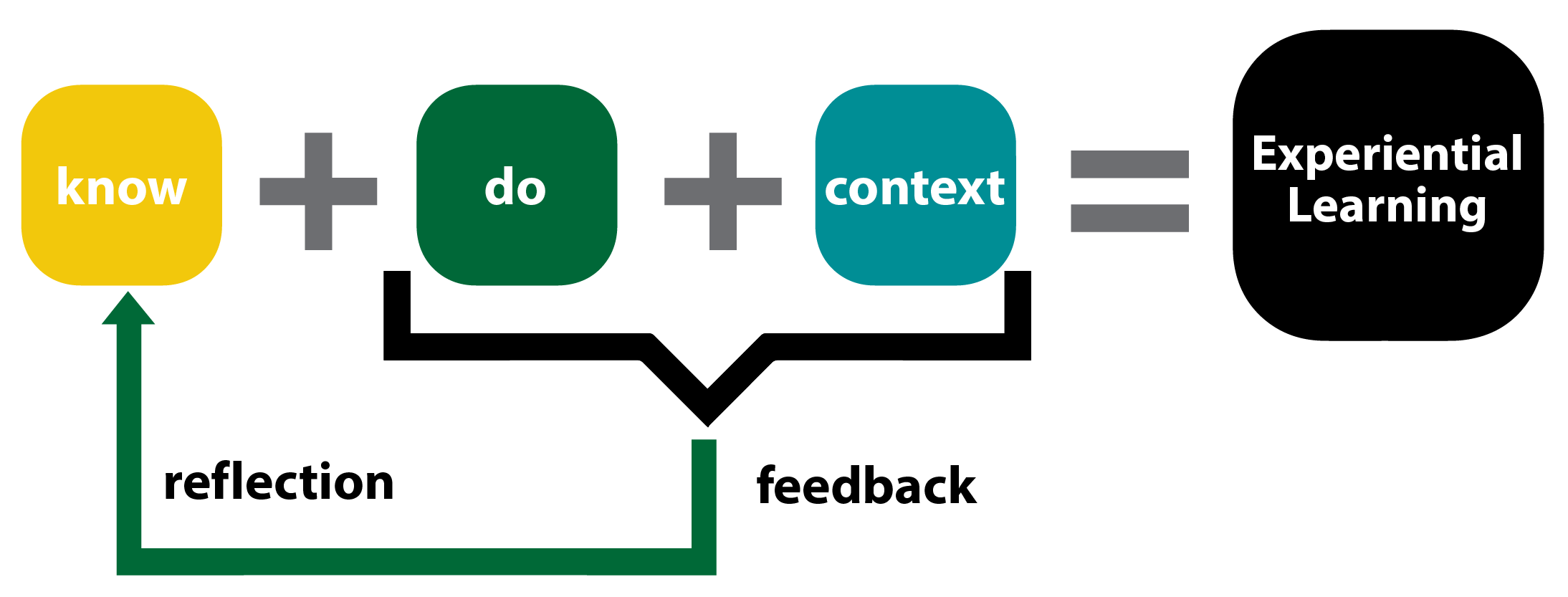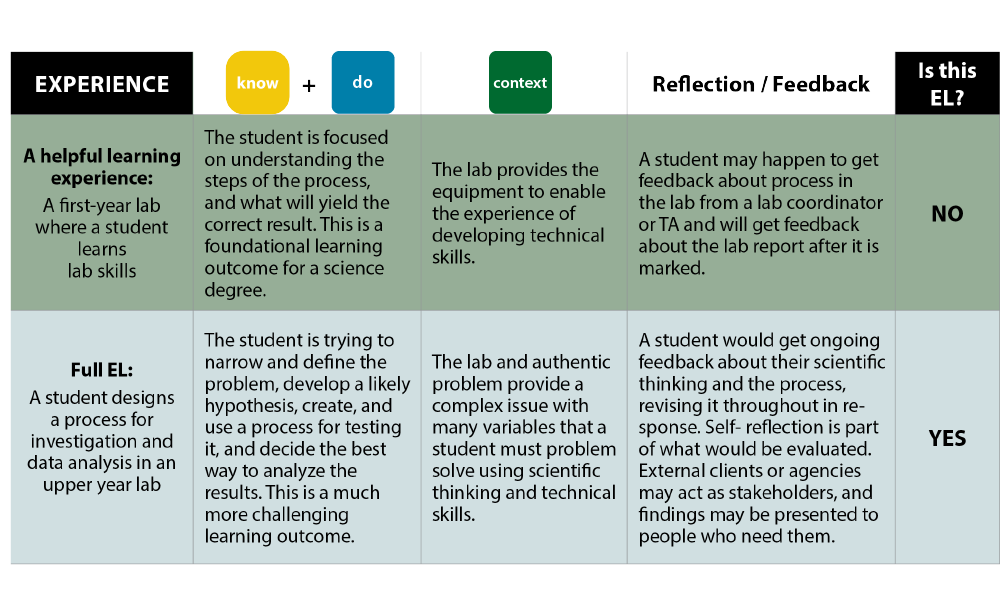Learning typically results in increased student knowledge. In Experiential Learning (EL), students’ knowledge is accompanied by competency in applying the knowledge skillfully because of four essential elements of EL:
- Doing: Students apply their knowledge by doing (active learning) in a situation with some unpredictable factors that require student decision-making.
- Context: The application occurs in an authentic context, where students need to make decisions about what is important and the best path forward. This may include an authentic problem, a real client whom students will help, or an audience beyond the class.
- Feedback: Students get information about how well they are learning as the learning occurs, and adjust their thinking, actions etc. in response as they learn.
- Reflection: Students consider the success of their approaches, generalizing what worked and considering how to improve as they learn.

Types of EL
Experiential learning occurs in the intersection between the disciplinary domain and the context of the experience.
- Domain refers to the types of disciplinary praxis (thinking and practice combined) that underly disciplinary competency.
- Context, the place where the EL occurs, shapes the types of experiences and their relative complexity.
Examples connected to Indigenization, internationalization, and sustainability are indicated in bold with an astericks*, recognizing that all experiential learning helps work towards better ways of knowing, doing, and being for people, planet, and prosperity.
|
|
Work or entrepreneurship |
Research |
Problem or project |
Community-engaged or service |
Creative |
|
In class |
COIL* |
||||
|
In |
Skills lab |
Creating a prototype or solution |
Create an artefact (sculpture, improv) Language lab* |
||
|
In workplace, community |
Design challenge with industrial commercial institutional partners |
Gallery, exhibit, performance |
* Indicates the example is connected to Indigenization, internationalization, and/or sustainability.
EL in your course
Experiential Learning resources:
- How to know when you need EL? (Educatus - GMCTL blog)
- Efficient feedback (Educatus - GMCTL blog)
- Grading Reflection (Educatus - GMCTL blog)
- EL Resources - 5 Top Picks (Educatus -GMCTL blog)
- Get help with designing your EL - contact the Gwenna Moss Centre
- Get help with a placement - contact Career Services
Curricular programming
Hands-on experiential learning opportunities like research, volunteering, summer and part-time jobs, study abroad, and internships all complement students’ in-class university experience and are great ways to develop professional skills.
RBC Learn to Work, Work to Learn program is a part of RBC Future Launch, helps students develop necessary skills to enter the workforce and enhance opportunities to advance in their career. With a primary focus on developing skills in networking, communication, negotiation, professionalism and critical thinking; students are given the opportunity to network and gain insight from employers in their industry of interest.
Career Services in partnership with the College of Agriculture and Bioresources and the College of Kinesiology provide a skills-focused learning course for students before, during and after summer work experience under the shared guidance of industry mentors and faculty facilitators. Built around the summer experience and offered throughout the academic year are numerous employment workshops, seminars and industry networking events to enhance student learning through professional practice and direct mentorship.
For more information, contact Ali Wehrkamp, Experiential Learning Coordinator.
For more information, contact Kim Matheson.
Future Skills Innovation Network (FUSION) is a part of the federally funded Future Skills Centre (FSC), is a national network of six Canadian universities focused on exploring innovative and inclusive experiential learning approaches to foster skill development and prepare university students to join a rapidly evolving world of work. The FUSION Skill-Development Curriculum is an interactive and engaging 10-hour online, self-study curriculum designed to wraparound and complement a student’s existing experiential learning opportunity (e.g., internship, student leadership role, research project, part-time job, volunteer placement, or summer work term). The FUSION curriculum focuses on helping students enhance skills across three critical 21st century skill domains: Metacognition, Problem Solving, and Communication.
For more information, contact Kim Matheson.
Funding
The Teaching and Learning Innovation Fund is a strategic fund intended to provide academic units with support for program level curriculum, assessment or instructional change initiatives and projects including experiential learning. Click the button below for further details.
Getting Help
Email the details of your project and/or questions to be connected with the appropriate supports.
You may be connected with the Gwenna Moss Centre for Teaching and Learning, Career Services, or another group depending on the nature of your request.
